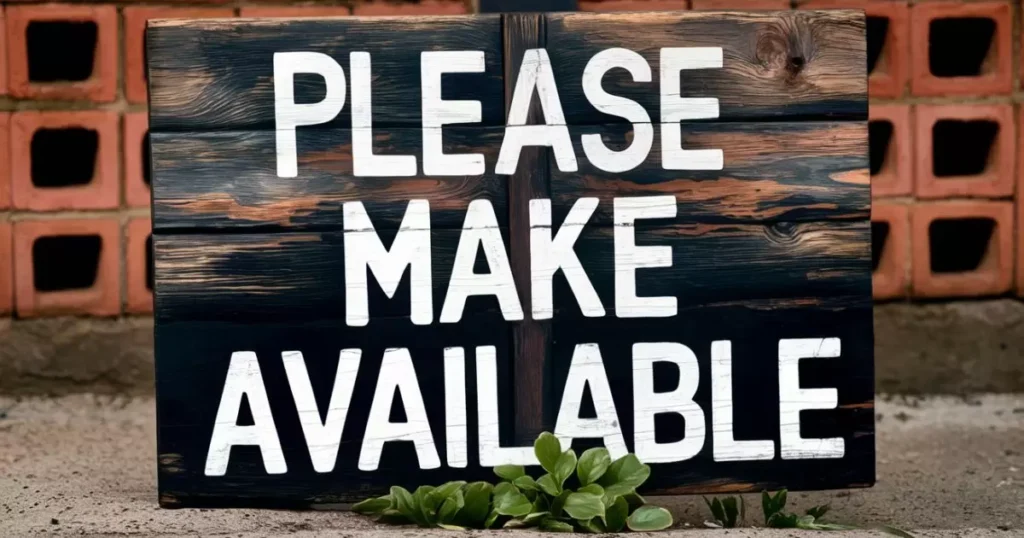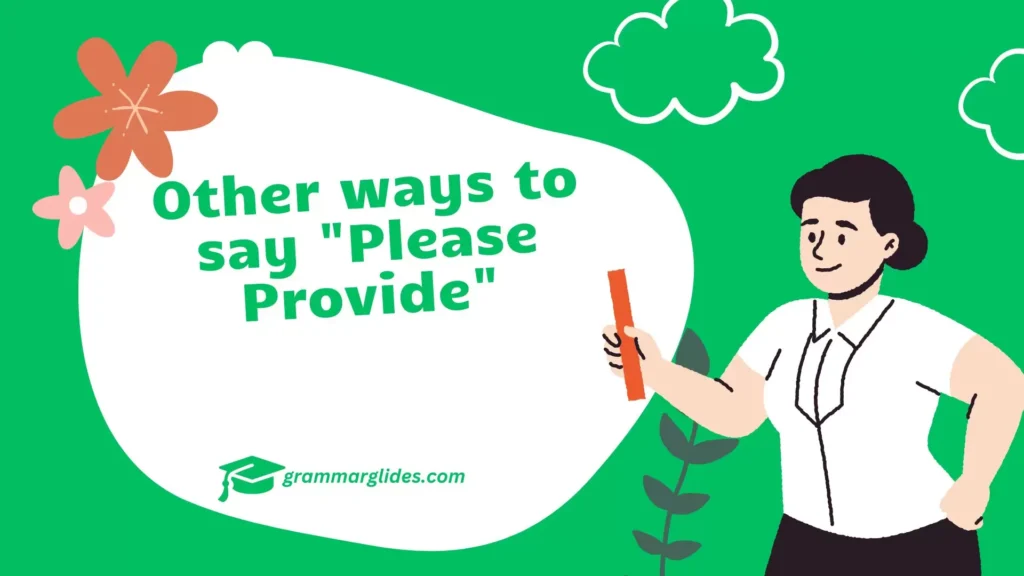When you need to request something, using varied phrasing can make your communication more effective and tailored to the situation.
Here are 30 creative ways to ask for something, each with scenarios, examples, and brief explanations.
1. “Kindly Share”
Scenario: Requesting information from a colleague.
Example 1: “Could you kindly share the latest project report with me?”
Example 2: “Please kindly share the data from yesterday’s meeting.”
Explanation: Adds a polite and courteous touch to your request. It’s suitable for both formal and informal contexts, emphasizing respectfulness.
2. “Would You Mind Providing”
Scenario: Asking for feedback from a team member.
Example 1: “Would you mind providing your thoughts on the proposal?”
Example 2: “Would you mind providing an update on the project status?”
Explanation: This phrase is both polite and respectful, making it ideal for situations where you want to show consideration for the other person’s time and effort.
3. “Please Supply”

Scenario: Requesting additional resources from a supplier.
Example 1: “Please supply the remaining inventory by the end of the week.”
Example 2: “We need you to please supply the necessary documents for the audit.”
Explanation: A direct and clear way to ask for something, suitable for formal business communication. It implies a straightforward request for essential items.
4. “Could You Provide”
Scenario: Requesting a document from a client.
Example 1: “Could you provide the signed contract at your earliest convenience?”
Example 2: “Could you provide us with your updated contact information?”
Explanation: This phrase is polite and professional, making it appropriate for formal requests. It indicates a need for action in a respectful manner.
5. “Would It Be Possible to Receive”
Scenario: Requesting a sample from a vendor.
Example 1: “Would it be possible to receive a sample of the new product?”
Example 2: “Would it be possible to receive a detailed report on the findings?”
Explanation: This phrase is polite and considerate, useful for requests where you want to accommodate the other person’s ability to fulfill the request.
6. “I Would Appreciate It If You Could”
Scenario: Asking a colleague for assistance.
Example 1: “I would appreciate it if you could send over the meeting minutes.”
Example 2: “I would appreciate it if you could review this document and provide feedback.”
Explanation: Expresses gratitude in advance, making it a polite way to request something. It’s effective in both professional and personal settings.
7. “Please Furnish”
Scenario: Requesting information for a report.
Example 1: “Please furnish the necessary details for the upcoming report.”
Example 2: “Please furnish the data required for the analysis by tomorrow.”
Explanation: A formal way to ask for information or materials. It is suitable for professional contexts where a certain level of formality is appropriate.
8. “Can You Provide”
Scenario: Requesting an update from a project team member.
Example 1: “Can you provide the latest updates on the project milestones?”
Example 2: “Can you provide the revised schedule for the upcoming tasks?”
Explanation: This phrase is clear and direct, making it effective for straightforward requests in both formal and informal situations.
9. “May I Request”
Scenario: Seeking approval or authorization.
Example 1: “May I request access to the financial records for review?”
Example 2: “May I request your approval on the proposed changes?”
Explanation: Adds a polite and formal tone to the request, making it suitable for situations requiring permission or authorization.
Other Ways to Say “With That Being Said”
10. “Could You Kindly Supply”
Scenario: Requesting materials from a partner.
Example 1: “Could you kindly supply the promotional materials for the event?”
Example 2: “Could you kindly supply the updated product list at your convenience?”
Explanation: Combines politeness with a clear request, ideal for professional settings where a courteous tone is important.
11. “Would You Be Able to Provide”
Scenario: Asking for support from a team member.
Example 1: “Would you be able to provide a brief summary of the project status?”
Example 2: “Would you be able to provide assistance with the upcoming presentation?”
Explanation: This phrase is considerate and polite, making it suitable for requests where you want to acknowledge the person’s ability to assist.
12. “Please Send Over”
Scenario: Requesting files or documents.
Example 1: “Please send over the final draft of the report.”
Example 2: “Please send over the signed agreement by end of day.”
Explanation: A straightforward and casual way to ask for items, suitable for less formal or more urgent requests.
13. “Would You Be So Kind As to”
Scenario: Asking for a favor.
Example 1: “Would you be so kind as to provide a reference for my application?”
Example 2: “Would you be so kind as to share the contact details for the supplier?”
Explanation: Adds a touch of formality and politeness, making it effective for requests that involve a favor or special consideration.
14. “I Would Be Grateful If You Could”
Scenario: Requesting additional details from a client.
Example 1: “I would be grateful if you could provide more information on your requirements.”
Example 2: “I would be grateful if you could send the necessary documents for processing.”
Explanation: Expresses gratitude and politeness, ideal for situations where you want to convey appreciation in advance.
15. “Please Provide at Your Earliest Convenience”
Scenario: Requesting urgent information.
Example 1: “Please provide the requested data at your earliest convenience.”
Example 2: “Please provide the missing documents at your earliest convenience.”
Explanation: Emphasizes urgency while maintaining politeness. Suitable for situations where timely receipt of the requested items is important.
16. “I Would Appreciate Your Assistance With”
Scenario: Seeking help with a task.
Example 1: “I would appreciate your assistance with the upcoming audit.”
Example 2: “I would appreciate your assistance with compiling the quarterly report.”
Explanation: A polite way to ask for help, emphasizing appreciation for the person’s support.
17. “Can You Kindly Forward”
Scenario: Requesting to pass on information.
Example 1: “Can you kindly forward the email to the rest of the team?”
Example 2: “Can you kindly forward the details to the marketing department?”
Explanation: Suitable for requests involving the distribution or sharing of information, with a polite tone.
18. “Would You Mind Sending”
Scenario: Asking for a file or document.
Example 1: “Would you mind sending the updated spreadsheet by the end of the day?”
Example 2: “Would you mind sending the photos from the event?”
Explanation: Adds a level of politeness and consideration, making it appropriate for less formal or collaborative requests.
19. “Please Deliver”
Scenario: Requesting delivery of goods or materials.
Example 1: “Please deliver the supplies to the address provided.”
Example 2: “Please deliver the promotional items before the event starts.”
Explanation: A direct way to request the delivery of items, suitable for logistics and operational contexts.
20. “I Would Like to Request”
Scenario: Formal request for information.
Example 1: “I would like to request the report on the recent survey.”
Example 2: “I would like to request a copy of the meeting minutes.”
Explanation: A formal and polite way to make a request, suitable for official or professional communication.
21. “Could You Kindly Assist With”
Scenario: Seeking help with a project.
Example 1: “Could you kindly assist with the preparation of the presentation?”
Example 2: “Could you kindly assist with the review of the draft proposal?”
Explanation: Combines politeness with a clear request for help, ideal for collaborative environments.
22. “Would You Be Able to Supply”
Scenario: Requesting resources.
Example 1: “Would you be able to supply the necessary equipment for the workshop?”
Example 2: “Would you be able to supply the list of contacts for the campaign?”
Explanation: A polite way to request resources or items, suitable for professional or formal settings.
23. “Please Make Available”

Scenario: Requesting access to information.
Example 1: “Please make available the latest figures for the report.”
Example 2: “Please make available the relevant documentation for review.”
Explanation: A clear and formal way to ask for information or materials, ideal for business or professional contexts.
24. “I Would Appreciate It If You Would”
Scenario: Requesting action.
Example 1: “I would appreciate it if you would confirm your attendance by Friday.”
Example 2: “I would appreciate it if you would provide your feedback on the draft.”
Explanation: Expresses appreciation in advance, making it a polite way to request action or response.
25. “Please Make Sure to Provide”
Scenario: Ensuring compliance with requirements.
Example 1: “Please make sure to provide all necessary documents for the application.”
Example 2: “Please make sure to provide a complete list of attendees for the event.”
Explanation: Emphasizes the importance of completeness and compliance, suitable for formal requests.
26. “Can You Supply”
Scenario: Requesting materials or information.
Example 1: “Can you supply the final budget report by Monday?”
Example 2: “Can you supply the contact details for the vendor?”
Explanation: A direct and straightforward way to request items or information, suitable for both formal and informal contexts.
27. “Please Ensure You Provide”
Scenario: Requesting specific information.
Example 1: “Please ensure you provide all required details for the report.”
Example 2: “Please ensure you provide the updated schedule by the end of the day.”
Explanation: Focuses on the necessity of providing specific information, ideal for formal or detailed requests.
28. “Would You Be Kind Enough to”
Scenario: Requesting a favor or assistance.
Example 1: “Would you be kind enough to provide a reference letter?”
Example 2: “Would you be kind enough to assist with the project proposal?”
Explanation: Adds a touch of formality and politeness, making it suitable for requests that involve personal favors.
29. “May I Request That You”
Scenario: Requesting specific action or information.
Example 1: “May I request that you provide an update on the deliverables?”
Example 2: “May I request that you submit your feedback by the end of the week?”
Explanation: A formal and respectful way to make a request, appropriate for professional settings.
30. “Please Offer”
Scenario: Requesting something to be made available.
Example 1: “Please offer the required documents for the meeting.”
Example 2: “Please offer your input on the new project proposal.”
Explanation: A polite and formal way to ask for something, suitable for professional or formal contexts.
Conclusion
In conclusion, choosing the right way to ask for something can enhance communication and ensure your request is received well.
Whether you’re looking for a formal approach or a more casual tone, these alternative phrases provide flexibility to match various situations and audiences.

Hi! I’m Lauren Reynolds, the author of Grammar Glides. I create easy-to-follow content that helps you master English with confidence. Let’s make learning English simple and enjoyable together!

